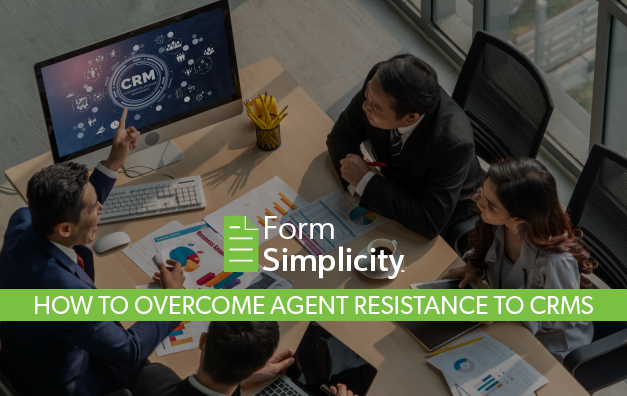
Top real estate agents use a CRM or customer relationship management technology to build and maintain their business. Yet, according to a 2024 study by the National Association of Realtors, nearly 40% of Realtors rarely or never use a CRM.
The NAR study shows that agents regularly use a transaction management program, like Form Simplicity from Florida Realtors, rather than a CRM.
Why do so many real estate agents resist using a CRM?
Let’s explore some of the reasons and ways to increase CRM adoption.
Understanding CRM resistance
CRMs can be complex to set up and use effectively. Non-tech-savvy agents may find the initial learning curve daunting and may need more time or resources to learn how to use a CRM.
Mastering a new system can be overwhelming, leading to reluctance to adopt any new technology. Step-by-step guides, user-friendly interfaces, and ongoing support can help ease this transition.
Time investment and busy schedules
Setting up a CRM involves a significant time investment to input data, customize the system, and maintain it. Agents already busy with their day-to-day tasks may find it challenging to carve out the time necessary to implement and manage a CRM. The perception that a CRM adds to their workload rather than streamlining it can be a major deterrent.
Demonstrating how CRMs can save time by giving real-world examples in the long run by automating routine tasks can change this perspective.
Resistance to change and traditional practices
Many agents are set in their ways, and changing their workflows seems unhelpful because what they do works for them. Their contacts are often located in disparate places: on their phones, listed on a spreadsheet, hidden in emails, printed on mailing labels, or written on paper in file folders. The thought of consolidating all contacts to one source can be overwhelming. Change can be challenging, and the comfort of familiar methods often prevails.
Highlighting success stories of successful agents who have transitioned to using CRMs – from the before and after viewpoint – can help inspire others to embrace change.
Perceived lack of need in smaller markets
Some agents might feel that they don’t need a CRM, especially if they work in a small market or have a steady stream of referrals that keeps them busy. They might not see the immediate benefits of a CRM in their specific situation. Without recognizing the potential long-term advantages, agents may not prioritize CRM adoption.
Again, emphasizing how CRMs can help manage client relationships more effectively and uncover new business opportunities can shift this perception, especially if you can show them peer examples.
Overwhelming choice can create decision paralysis
The sheer number of CRM options available can be overwhelming. Agents might find it difficult to choose the right one that suits their needs, leading them to avoid deciding altogether. The fear of selecting the wrong tool and the effort required to switch later on can paralyze the decision-making process.
Providing clear comparisons and recommendations can simplify this process and help agents make informed choices. A great place for agents to start: if you have access to Tech Helpline, reach out to an expert there to walk you through various CRM choices and help you pick one that’s right for you.
Fear of losing leads when leaving a brokerage
For agents who work for brokerages that provide a CRM, the cost is often not a consideration as it’s included in the fees an agent may pay their brokerage. Their resistance is more likely due to the fear that if they ever leave the brokerage, their brokerage will take their leads. However, the reality is that brokerages already have most of an agent’s leads from the business they conduct there. Most clients choose the agent, not the brokerage, so should this be a concern?
Transparency is crucial: Clear policies outlining data ownership and portability can build trust and encourage CRM adoption.
How to increase CRM adoption
Even when agents have CRM access, various factors contribute to underutilization. Real estate agents often have busy schedules with client meetings, showings, and administrative tasks. As a result, they may struggle to find time to update and manage their CRM regularly, especially if they perceive it as an additional task rather than a time-saving tool.
Action: Demonstrating the time-saving features of CRMs can help agents integrate them more seamlessly into their routines.
Seamless integration with existing workflow
If the CRM doesn’t integrate well with an agent’s existing workflow, it can feel like an extra step rather than a seamless part of their daily routine. Agents might find switching between different tools or manually entering data into the CRM cumbersome.
Action: Agents need a CRM that is fully integrated with their other tech tools, which will facilitate greater adoption.
Training to reduce knowledge gaps
Even if agents have access to a CRM, they may not be taking the time to train how to use it effectively. Without understanding the full capabilities of the CRM, agents might only use it for basic tasks, thus using it occasionally – or avoid it altogether.
Action: Personalized training programs, such as on-demand videos and podcasts focusing on CRM benefits to engage interest in using them, can empower agents to embrace CRMs.
Less is more with CRMs
Some CRMs offer so many features that they can be overwhelming for agents who may not know where to start or how to prioritize their use. “Bloatware” can lead to underutilization, where only a fraction of the CRM’s capabilities are used.
Action: Simplifying how agents can use a CRM and providing clear guidance on the essential features can make CRM more approachable.
Focus on the immediate benefits and long-term vision
Consider CRM usage from an agent’s point of view: “What’s in it for me?” If agents don’t see immediate results or how a CRM can help them quickly improve their business, they are more likely to question its value. Agents work in a results-driven industry, and tools that don’t deliver visible outcomes quickly can be ignored.
Action: Highlighting the long-term benefits of CRM usage, such as improved client relationships and business growth, can encourage sustained use.
Offering tangible incentives
Providing tangible incentives for CRM usage, such as performance-based rewards or recognition, can motivate agents to embrace the technology. Highlighting success stories and sharing positive outcomes can also serve as powerful motivators.
While getting more agents to use a CRM can be daunting, understanding the reasons behind their resistance and employing tactics to address these concerns can significantly improve adoption rates. Agents can be encouraged to leverage CRMs to enhance their business operations and client relationships by fostering trust, simplifying technology, and offering clear benefits.
Agents who do not use CRM technology need to be convinced that they are missing out on a tool that can be the key to remaining competitive and increasing their deal flow.
Ready to simplify your signing process?
Discover how Form Simplicity’s digital signatures can save you time and keep transactions secure.
- Click here to learn more about Form Simplicity’s Ultimate Edition, which includes unlimited digital signatures and document storage.
- Interested in providing the Ultimate Edition for your office? Let’s connect.




